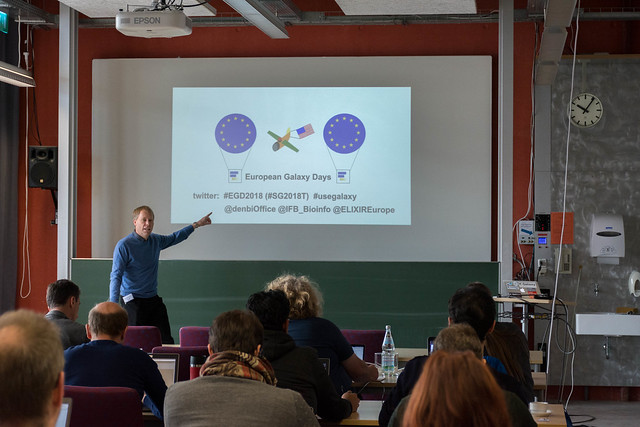European Galaxy Days were held 19 and 20 November 2018 in Freiburg, Germany. >40 participants from all Europe and even US meet for this two day gathering.
The first day was mostly focused on the current state of the Galaxy framework with several talks and demonstrations:
- Björn: “State of the Galaxy Project - priorities, plans, and community (from a European perspective)”
- Matthias Bernt: “Establishing a Galaxy Server and building a Galaxy User Community from scratch. A field report from the UFZ Leipzig”
- Geoffrey Nelson: “Refinery: a data management, analysis, and visualization platform using the Galaxy workbench (plus Demo)”
- Anika: “Galaxy Community Conference 2019 in Freiburg”
- Thomas Wollman: “Galaxy Image Analysis: Web-based systematic phenotyping”
- Jochen Bick: “Interactive plotting with ggplot and shiny in Galaxy”
- Krzysztof Poterlowicz: “EWAS tool development / Training / Elixir-CNV community”
- Bérénice: “RNA-Seq data analysis in Galaxy: lessons learned and what next?”
- Mehmet: “Single Cell in Galaxy, from pre-processing to analysis”
During the second day, the focus was on developing and extending the Galaxy ecosystem:
- Marius van den Beek, John Chilton: “Travelling with warp-speed, an update on Galaxy workflows”
- Nicola Soranzo: “Beta Python 3 support for Galaxy in release 18.09, at last!”
- Musumba Awori: “Draft genome of a bacterium (Xenorhabdus griffiniae XN45) isolated from Kenyan Steinernema nematodes reveals its potential synthesis of a spectrum of specialised metabolites”
- Marco Tangaro: “Providing Galaxy based bioinformatic environments through cloud technologies (plus demo)”
- Sveinung Gundersen: “Proposed infrastructure to search, fetch and analyze FAIRified genomic tracks in Galaxy”
- Helena: “State of the European Galaxy Project”
- Bérénice: “Update on the Galaxy Training Network”
- Nikolay Vazov: “Two customizations in Galaxy”
- Yvan Le Bras: “GalaxyE, a new vision of workflow oriented Biodiversity research?”
- Anup Kumar: “Machine learning with Galaxy”
You can see many of the presentations on the Galaxy Hub

